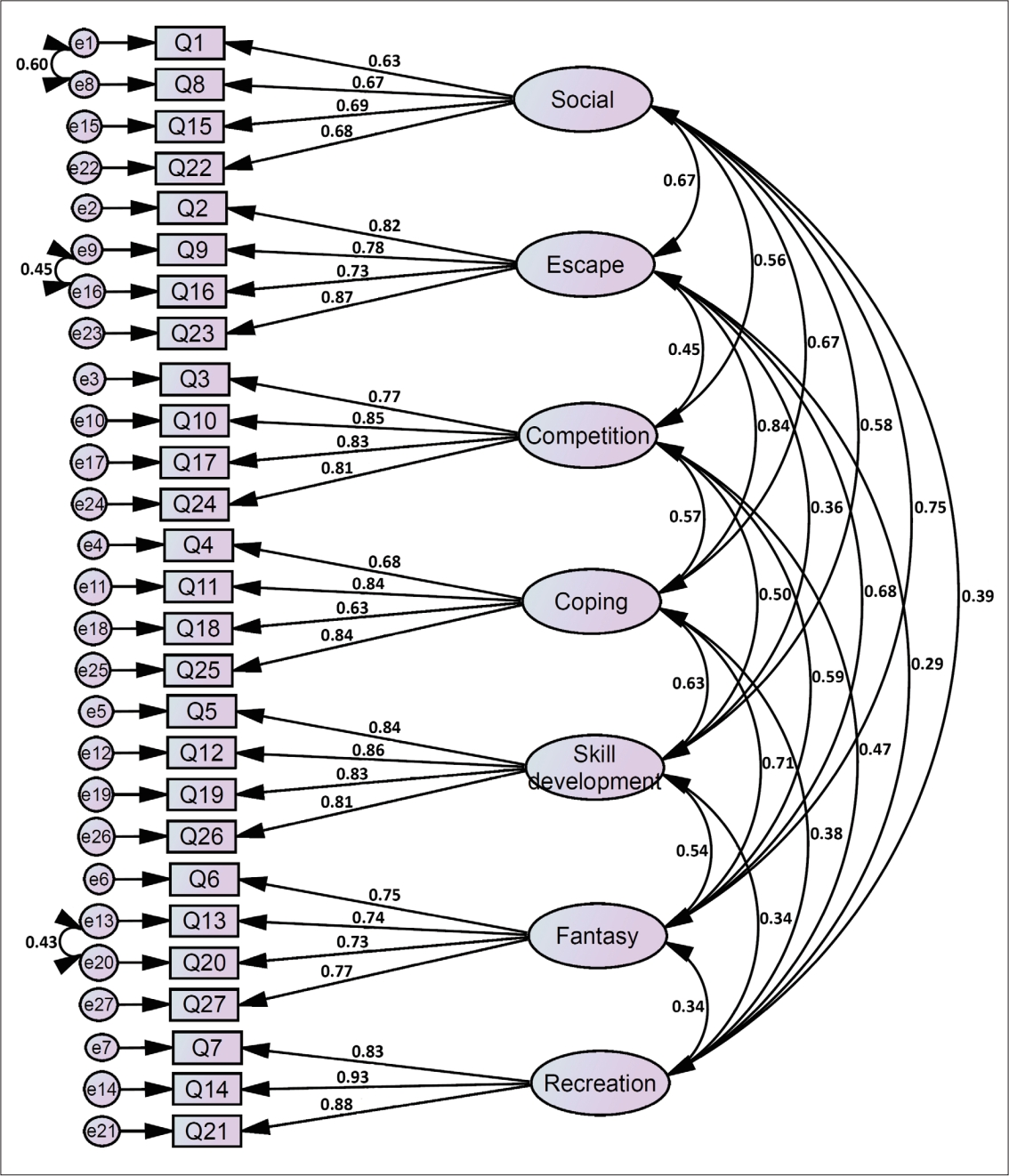4. Johnson D, Wyeth P, Sweetser P. The people-game-play model for understanding videogamesтАЩ impact on wellbeing. In: Proceedings of the 2013 IEEE International Games Innovation Conference (IGIC); 2013 Sep 23-25; Vancouver, Canada. IEEE. 2013;85-88.

5. Gentile DA. The multiple dimensions of video game effects. Child Dev Perspect 2011;5:75-81.

7. Granic I, Lobel A, Engels RC. The benefits of playing video games. Am Psychol 2014;69:66-78.


13. Rafiemanesh H, Farnam R, Sangchooli A, Rahimi J, Hamzehzadeh M, Ghani K, et al. Online gaming and internet gaming disorder in Iran: patterns, motivations, and correlates. Curr Psychol 2022;Jan;[Epub].
https://doi.org/10.1007/s12144-021-02490-0.


15. Aminimanesh S, Nazari AM, Farzad F, Khanzade M. The role of psychological motivations in online gaming addiction among adolescents. JHC 2017;19:147-157.
16. OтАЩBrien C. A systematic review and meta-analysis of player motivations and problematic involvement in multiplayer online games: exploring an alternative diagnostic approach that minimizes the risk of pathologizing healthy gaming behaviors. Rochester: John Fisher College; 2018.
18. Kim BN, Kang HS. Korean validation of the motives for online gaming questionnaire: focusing on its factor structure and incremental validity. Addict Behav 2021;122:107019


21. Ballabio M, Griffiths MD, Urb├бn R, Quartiroli A, Demetrovics Z, Kir├бly O. Do gaming motives mediate between psychiatric symptoms and problematic gaming? An empirical survey study. Addict Res Theory 2017;25:397-408.

22. Lafreni├иre MAK, Verner-Filion J, Vallerand RJ. Development and validation of the gaming motivation scale (GAMS). Pers Individ Differ 2012;53:827-831.

23. Bartle R. Hearts, clubs, diamonds, spades: Players who suit MUDs. Journal of MUD Research 1996;1:19
24. Yee N. Motivations for play in online games. Cyberpsychol Behav 2006;9:772-775.


27. Yee N, Ducheneaut N, Nelson L. Online gaming motivations scale: development and validation. In: Proceedings of the SIGCHI Conference on Human Factors in Computing Systems; 2012 May 5-10; Austin, TX, USA. Association for Computing Machinery. 2012;2803-2806.
28. Ryan RM, Rigby CS, Przybylski A. The motivational pull of video games: a self-determination theory approach. Motiv Emot 2006;30:344-360.


29. In: In : Edy DF, Bellani E, Arifin M. In: 8th International Conference of Asian Association of Indigenous and Cultural Psychology (ICAAIP 2017); 2017 Aug 21-23; Makassar, Indonesia. Atlantis Press. 2017;148
30. ┼аpor─Нi─З B, Glavak-Tkali─З R. The relationship between online gaming motivation, self-concept clarity and tendency toward problematic gaming. Cyberpsychology 2018;12.


31. Ye┼Яilyurt F, Erdo─Яan I. Ergenlerin ├зevrim i├зi oyunlardaki deneyimleri ve oyuna ili┼Яkin tutumlar─▒n─▒n incelenmesi [doctoral thesis]. Iatanbul, Istanbul University. 2014;182
32. Evren C, Evren B, Dalbudak E, Top├зu M, Kutlu N. Psychometric validation of the Turkish motives for online gaming questionnaire (MOGQ) across university students and video game players. Addicta 2020;7:81-89.

33. Nora CR, Zoboli E, Vieira MM. Validation by experts: importance in translation and adaptation of instruments. Revista Ga├║cha de Enfermagem 2018;12:38
34. Kir├бly O, B┼Сthe B, Ramos-Diaz J, Rahimi-Movaghar A, Lukavska K, Hrabec O, et al. Ten-Item Internet Gaming Disorder Test (IGDT-10): measurement invariance and cross-cultural validation across seven language-based samples. Psychol Addict Behav 2019;33:91-103.


35. Davis LL. Instrument review: getting the most from a panel of experts. Appl Nurs Res 1992;5:194-197.

37. Di Blasi M, Giardina A, Coco GL, Giordano C, Billieux J, Schimmenti A. A compensatory model to understand dysfunctional personality traits in problematic gaming: the role of vulnerable narcissism. Pers Individ Differ 2020;160:109921

38. Donsbach W. The international encyclopedia of communication. Hoboken: Wiley Online Library; 2008.
39. Snyder CR. Coping: the psychology of what works. New York: Oxford University Press; 1999.
40. Knobloch-Westerwick S, Hastall MR, Rossmann M. Coping or escaping? Effects of life dissatisfaction on selective exposure. Commun Res 2009;36:207-228.
41. Veltri N, Krasnova H, Baumann A, Kalayamthanam N. Gender differences in online gaming: a literature review. In: Proceedings of the 20th Americas Conference on Information Systems, AMCIS 2014; 2014 Aug 7-9; Savannah, GA, USA. AMCIS. 2014;1-11.
42. Chou C, Tsai MJ. Gender differences in Taiwan high school studentsтАЩ computer game playing. Comput Hum Behav 2007;23:812-824.

43. Denney NW. Critical thinking during the adult years: has the developmental function changed over the last four decades? Exp Aging Res 1995;21:191-207.


44. Melodia F, Canale N, Griffiths MD. The role of avoidance coping and escape motives in problematic online gaming: a systematic literature review. Int J Ment Health Addict 2020;20:996-1022.












